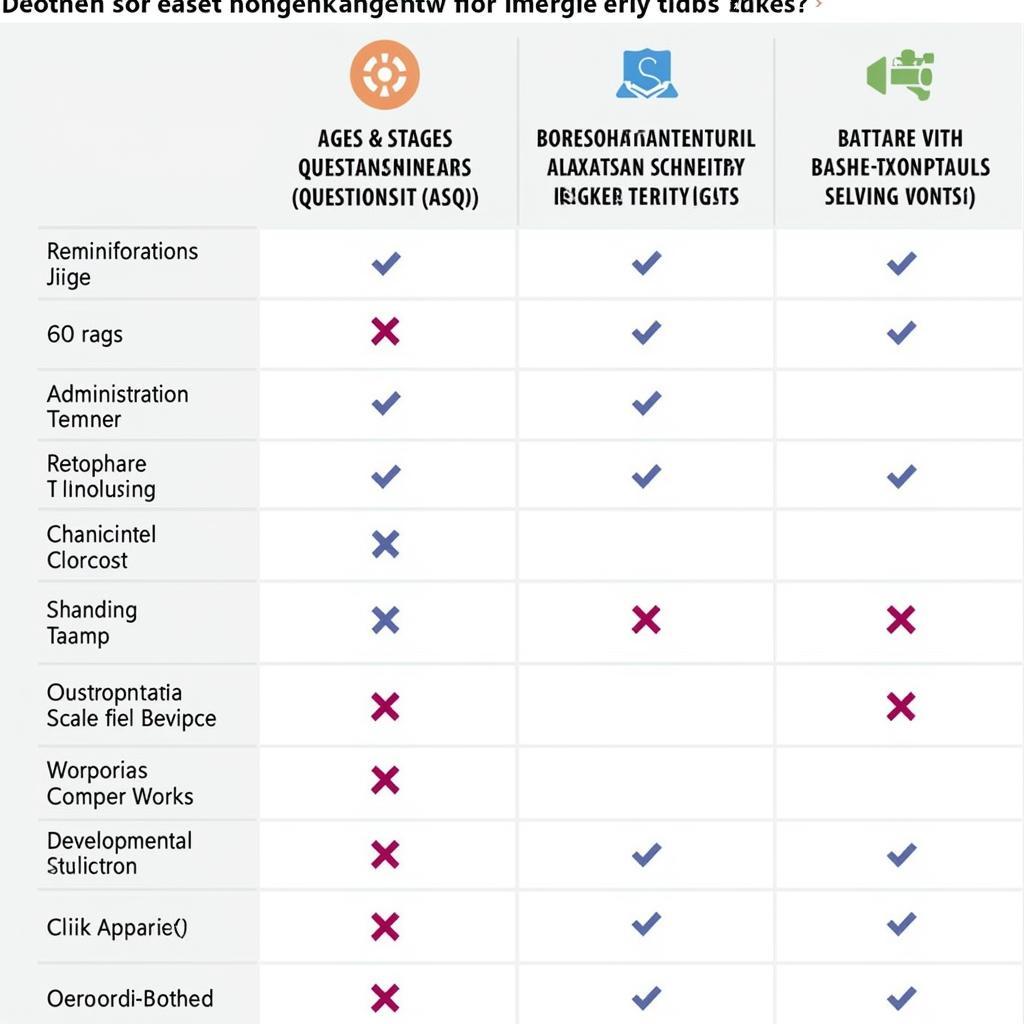Developmental screening tools are essential for identifying potential developmental delays in children attending child care. Early detection allows for timely intervention and support, maximizing a child’s opportunities for healthy development. These tools provide valuable insights for caregivers and parents, enabling them to create individualized care plans and connect families with appropriate resources.
Understanding the Importance of Developmental Screening Tools
Developmental screening isn’t a diagnosis, but rather a first step in identifying children who may benefit from further evaluation. It involves a series of brief assessments and observations focusing on key developmental milestones in areas such as language, motor skills, cognitive abilities, and social-emotional development. Early intervention can significantly impact a child’s trajectory, making developmental screening a crucial component of quality child care. child care assessment tools can provide a comprehensive evaluation.
How Developmental Screening Benefits Children, Families, and Caregivers
- Children: Early identification of developmental delays allows for timely intervention, which can improve outcomes in areas such as language, cognition, and social-emotional development.
- Families: Screening provides parents with valuable information about their child’s development and connects them with resources and support services if needed.
- Caregivers: Screening tools equip caregivers with the knowledge to tailor their care to each child’s unique developmental needs and create a supportive learning environment.
 Developmental Screening Process in Child Care
Developmental Screening Process in Child Care
Choosing the Right Developmental Screening Tools
Selecting appropriate developmental screening tools is crucial for accurate and effective assessment. Several factors influence this decision, including the age range of the children, the specific developmental areas being assessed, and the resources available within the child care setting. It is essential to choose tools that are evidence-based, reliable, and culturally sensitive. types of assessment tools in infant toddler care provides valuable information on choosing appropriate tools.
Commonly Used Developmental Screening Tools in Child Care
Several well-established developmental screening tools are frequently used in child care settings. These include:
- Ages & Stages Questionnaires (ASQ): A parent-completed questionnaire that covers communication, gross motor, fine motor, problem-solving, and personal-social skills.
- Battelle Developmental Inventory Screening Test (BDIST-2): A screening test administered by trained professionals, covering adaptive, personal-social, communication, motor, and cognitive development.
- Denver Developmental Screening Test II (Denver II): A quick and easy screening test administered by professionals, assessing personal-social, fine motor-adaptive, language, and gross motor skills.
 Comparison of Developmental Screening Tools
Comparison of Developmental Screening Tools
“Choosing the right screening tool depends on the specific needs of the child care setting,” says Dr. Sarah Miller, a child development specialist. “It’s important to consider factors such as age range, developmental domains, and cultural appropriateness.”
Implementing Developmental Screening in Child Care
Effective implementation of developmental screening involves careful planning, training, and communication. Caregivers should be trained on how to administer the chosen tools accurately and interpret the results appropriately. It is equally important to establish a clear process for communicating results to families and connecting them with necessary resources and support services. intervention tool foster care can further assist in the process.
Best Practices for Developmental Screening
- Create a schedule: Establish a regular schedule for developmental screening, typically at specific age intervals.
- Train staff: Ensure all caregivers are adequately trained on the administration and interpretation of the chosen screening tools.
- Communicate with families: Clearly explain the purpose and process of developmental screening to families and obtain their consent.
- Follow up: Develop a system for following up on screening results and connecting families with appropriate resources.
“Open communication with families is key to successful developmental screening,” states Dr. Maria Rodriguez, an early childhood educator. “Parents are essential partners in this process and should be actively involved in every step.”
Conclusion
Developmental Screening Tools For Child Care are invaluable resources for promoting early identification and intervention for developmental delays. By incorporating these tools into their practice, child care providers can create a supportive environment that fosters healthy development for all children. Utilizing appropriate developmental screening tools enables early identification and timely intervention, maximizing every child’s potential. identify types of care and support planning tools available for a more comprehensive understanding.
Need support? Contact us via WhatsApp: +1(641)206-8880, Email: [email protected] or visit us at 910 Cedar Lane, Chicago, IL 60605, USA. Our customer service team is available 24/7.

Leave a Reply